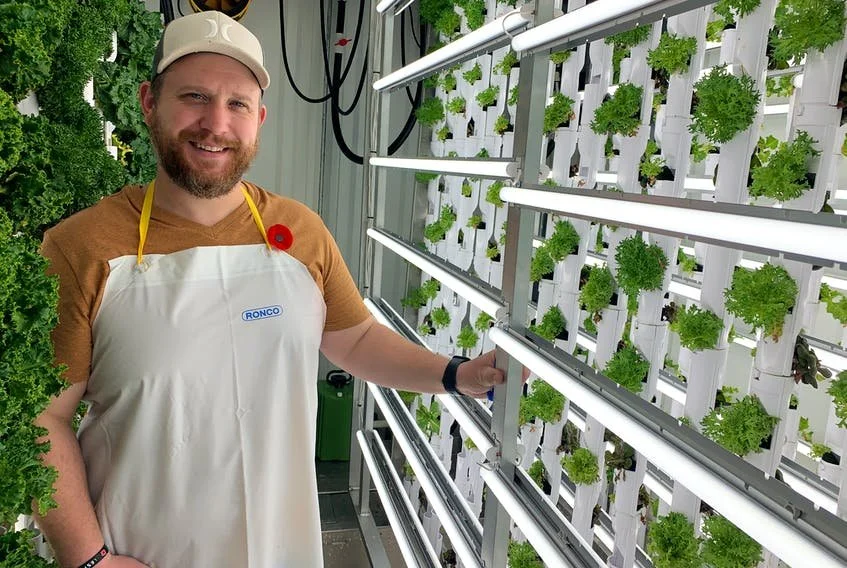Enfield Hydroponic Farm Can Grow Anything A Chef Wants, Including Wasabi Arugula
Bill Spurr · Multimedia Journalist
Novermber 9, 2021
Kris Sutton, who with his wife Brenda owns Sutton's Vertical Gardens in Enfield, says his hydroponic farm can match the yield of a two or three-acre field. - Bill Spurr
From the outside, it just looks like a nice, good-sized metal shed.
Inside, though, Kristopher Sutton has taken on the hybrid role of farmer and scientist in the backyard of his Enfield home.
His business, Sutton’s Vertical Gardens, which he runs with his wife Brenda, is as fresh as his produce, with the first plants harvested this week.
SVG runs out of a converted 320-square-foot shipping container turned into a hydroponic operation by Farm Box Foods, a company in Colorado.
Kris Sutton harvests the first batch of greens at his new Vertical Hydroponic Farm in Enfield. - Bill Spurr
“Some assembly was required; I had to put the grow walls together,” Sutton said.
“Prior to it coming, they have a program called Base Camp. It's an online course that teaches you how to run the systems, plant the plants, deal with the watering.”
As he was growing up in Milford, Sutton’s mother was an avid flower grower, and his grandparents in Newfoundland had a farm and sold produce “around the bay.” Seven or eight years ago, he bumped up his gardening game and built a greenhouse out of a trampoline a friend at work gave him.
Like everyone who grows tomatoes, Sutton became a popular neighbour.
“It just went from there,” he said.
“I did a lot of experimenting with different greens. I found greens neat to grow because you can cut them and they’ll grow back. Kale, Swiss chard, it went with every meal.
“Then I started getting into vegetables, tomatoes, a lot of peppers; every year I would try a different vegetable. I had to give a lot of it away because I quickly found a single fella didn’t eat that much.”
The vertical hydroponic farm, or VHF, produces 1,026 plants per week and costs US$150,000, plus shipping.
Hydroponic farming requires regulated humidity and temperature, and the watering and lighting are on precise schedules. Sutton’s house uses well water, but the farm is on municipal water because of the pH balance. Sensors take out some of the guess work, and conditions inside the VHF are the same in January as they are in July.
“It doesn’t matter what it’s doing outside, the cold, the rain, this farm will operate 365 days a year, constantly putting out weekly yields,” said Sutton, who works full time as an aircraft mechanic.
“It’s a huge investment, a scary investment. I didn’t just wake up one morning and say, ‘Let me spend as much money as I can on a unit’ and take a gamble.”
A tray of greens ready for the next stage of growth. - Bill Spurr
The Suttons enrolled in a program called Shop, eh?, run by the East Hants Chamber of Commerce, that has already led to calls from a couple of restaurants, including a new local sushi spot.
Sutton thinks a batch of wasabi arugula might go nicely with sushi and says he can grow any specialty crop a chef wants, and on a schedule.
Farm Box Foods estimates it takes 15 hours a week to run a VHF, but Sutton is finding that on the low side.
“I’m quickly realizing there’s a little more time needed, with the harvesting and the business side of it. There’s probably 25 hours a week, depending. It’s a busy hobby,” said Sutton, who expects to get more efficient.
“I’ve already figured out a few techniques to make things go quicker.”
Both Suttons plan to keep their day jobs, but Kris’s long-term goal is to do just this. He expects to continue to focus on greens but isn’t ruling out other crops since he knows of a unit out west, the same size as his, doing strawberries. He says his yield will be the equivalent of a two- or three-acre field, and in just his second month has already changed up his crop rotation.
“We’ve been doing some trials, so there are a few plants here that we probably won’t be growing because they haven’t grown to the potential I thought.”
Lead Photo: Kris Sutton, who with his wife Brenda owns Sutton's Vertical Gardens in Enfield, says his hydroponic farm can match the yield of a two or three-acre field. - Bill Spurr


